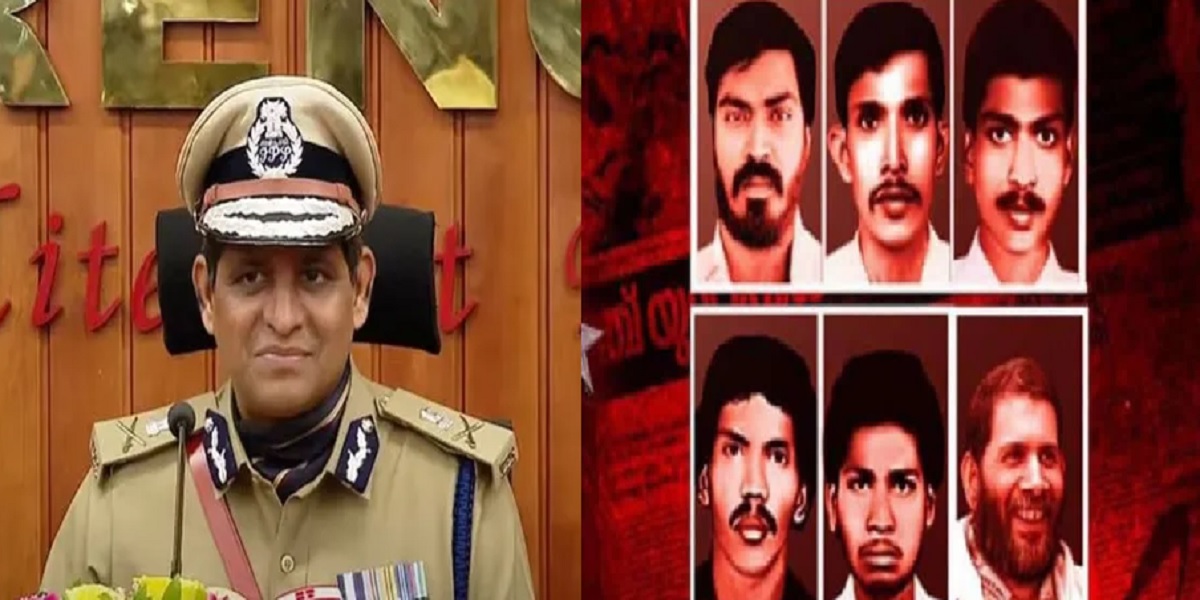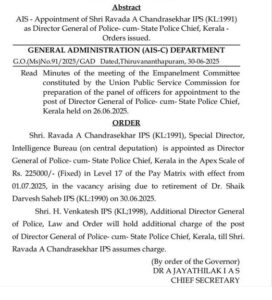Published Jul 01, 2025 | 5:40 PM ⚊ Updated Jul 01, 2025 | 6:35 PM

Adding to the storm, the air is thick with debate over Chandrasekhar's alleged role in the infamous Koothuparamba police firing of 1994. (Supplied)
Synopsis: Ravada Chandrasekhar’s appointment as Kerala’s new DGP has triggered political controversy over his alleged role in the 1994 Koothuparamba police firing that killed five DYFI activists. Though exonerated by courts, emotional scars remain, especially in CPI(M) strongholds like Kannur. Opposition parties question the appointment, alleging political collusion and sidelining of senior officers for a controversial choice.
How does a state welcome its new police chief? In Kerala, it’s with a full-blown political storm over an incident buried decades in the past.
As Ravada A Chandrasekhar, a 1991 batch IPS officer, took charge as the new State Police Chief on Tuesday, 1 July, controversy was already waiting at his doorstep. The Cabinet’s decision, made in a special meeting, set the stage—but it was the scenes that followed which captured headlines.
On his very first day in office, a dramatic disruption at his press conference by a man claiming to be a former police officer from Kannur raised serious allegations against the police force. Adding to the storm, the air has been thick with debate over Chandrasekhar’s alleged role in the infamous Koothuparamba police firing of 1994—an incident from his early service years when he was the Thalassery ASP, reviving old wounds that refuse to heal.
Ironically, Chandrasekhar’s first official program as DGP will now take him straight to Kannur—Left stronghold, political battleground, and a district with a history soaked in blood and martyrdom.
Kerala’s 41st Police Chief, Ravada Chandrasekhar, is no stranger to controversy or conflict. Hailing from the serene, paddy-rich Godavari region of Andhra Pradesh, a land far removed from political violence, he began his policing career in one of Kerala’s most politically charged and blood-soaked districts, Kannur.
In the 1990s, Kannur was synonymous with political killings and bomb culture. Violence wasn’t the monopoly of any single party—CPI(M) on one side, RSS, Congress, and IUML on the other. All had their “martyrs,” their blood-stained milestones, their memorials.
And smack in the middle of this, the young Chandrasekhar was posted as Assistant Superintendent of Police in Thalassery—perhaps the toughest political flashpoint in the district.
But it was the Koothuparamba police firing in 1994, that dragged Chandrasekhar into an enduring controversy. When police opened fire on protesting DYFI activists, five young lives, KK Rajeevan, Madhu, Shibulal, Babu, and Roshan, were lost. Six others were injured.
The political fallout was immediate and intense. Chandrasekhar, the ASP on duty, was booked for murder. The case would chase him for nearly two decades.
Yet, his career didn’t derail. Chandrasekhar went on to serve as Superintendent of Police in Wayanad, Malappuram, Ernakulam Rural, and Palakkad. He later rose to DIG of Thrissur and Kochi ranges, and Commissioner of Police in Thiruvananthapuram. From 2008 onwards, he was on central deputation, holding key positions in central investigative and security agencies.
Finally, on 25 June, 2012, the Kerala High Court quashed the charges against him, bringing legal closure to a chapter that had defined much of his career.
But as he now steps into the top post as Kerala’s DGP, the shadows of Koothuparamba and the turbulent Kannur years refuse to fade, setting the stage for yet another politically loaded innings.
MV Raghavan, fondly called MVR, was no stranger to political turbulence. Once a towering figure in the CPI(M), his defection and subsequent rise as a minister in the UDF government had already made him a polarizing figure.
On 25 November, 1994, as his convoy made its way along Thalassery Road in Kannur, it drove straight into one of the most volatile political flashpoints Kerala had seen in years.
Thousands of DYFI activists had gathered that day, staging a fierce blockade against the state government’s controversial self-financing education policy. The air was charged with slogans and anger. Efforts by the police to control the crowd with tear gas and lathi charges proved futile. The situation spiralled out of control.
It was only two days earlier that Ravada Chandrasekhar, newly transferred from Hyderabad, had taken charge as the ASP in Thalassery. Now, he found himself thrust into this political storm.
Acting on the instructions of the Executive Magistrate and the DIG, police resorted to firing in two separate rounds, first near Koothuparamba Town Hall and again closer to the police station. The consequences were devastating. Five DYFI activists lost their lives in the firing.
A judicial inquiry completed in 1997 harshly criticized the police action, describing the firing as, unjustified. This finding led to a magistrate court later framing charges against Chandrasekhar, then Sub-Divisional Magistrate Antony, DySP Abdul Hakkim Bathery, and three police constables—P K Lukose, Sivadasan, and Balachandran—for murder, attempted murder, and criminal conspiracy.
The case, born out of a private complaint, has continued to shadow the career of not only Chandrashekar, but also other five officers involved ever since.

Ravada Chandrasekhar has only a year left in service, as Kerala DGP.
Though the Kerala High Court quashed the case against him in 2012 and the Supreme Court later upheld that order, the incident remains a sensitive chapter in the state’s political history, especially for the CPI(M), which lost five DYFI activists in the firing.
Senior CPI(M) leaders like P Jayarajan and Kannur district secretary KK Ragesh defended Chandrasekhar’s appointment, clarifying that it was an administrative decision and not a political one.
They pointed out that Chandrasekhar, then a junior officer from Andhra Pradesh, had assumed charge as Thalassery ASP just two days before the incident and was not part of any conspiracy.
The Justice K Padmanabhan Nair Commission too had blamed the lathicharge on then DySP Abdul Hakeem, not Chandrasekhar.
”The commission clearly stated that the unrest was triggered by an avoidable lathicharge led by then DySP Abdul Hakeem Bathery. Ravada Chandrasekhar was new to the state and cannot be linked to any conspiracy. This is documented in the inquiry report,” said Ragesh.
Ratheesh (name changed on request), a local CPM cadre told South First that, ”We are not happy with the new DGP’s appointment. The party still invokes the martyrs’ names during election campaigns and cultural events. If we are using their legacy for political gain, the least we can do is show sincerity towards their memory and respect the emotions of lakhs of party cadres.”
“This is Kannur—where the heart of the Left beats. By forgetting all this, how can senior leaders simply hide behind legal documents and court orders? It feels like an insult to the sacrifices made,” he added.
Despite the court exoneration and a clean service record that included key postings under two previous Left governments, sections within the CPI(M) have raised concerns, citing the emotional scars the incident still holds in Kerala’s political landscape.
AICC general secretary KC Venugopal on Tuesday strongly criticised the appointment of Ravada Chandrasekhar as the new DGP in Kerala, calling it a “political deal” struck between the CPI(M)-led Kerala government and the BJP-led Centre.
Venugopal raised concerns over the sidelining of senior IPS officers like Yogesh Gupta and Nitin Agarwal, questioning the rationale behind choosing Chandrasekhar for the top post.
He accused the CPI(M) of disregarding the sentiments of its own cadres and “forgetting its martyrs.”
Meanwhile, Youth Congress state vice president Abin Varghese also voiced his dissent through a sarcastic Facebook post.
He wrote, “Congratulations to both the Modi and Pinarayi governments for appointing Ravada Chandrasekhar—then the Kannur ASP who ordered the Koothuparamba firing—as the new Kerala Police Chief.”
(Edited by Sumavarsha)

